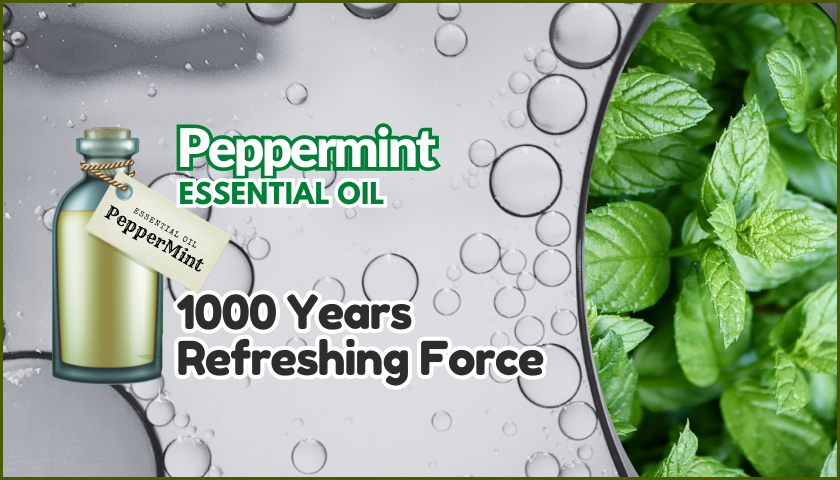Let’s delve into the refreshing power of Peppermint Essential Oil. Look at the history, common names and botanical names of Peppermint Essential Oil. Methods of application and top 10 of the best Peppermint Essential oil Benefits. The essential oil is extracted from the fresh leaves. It is possibly the most commonly recognized essential oil in the world. It contains over 40 different compounds including the popularly known menthol. Peppermint is often described as cooling, refreshing, reinvigorating as well as minty. The essential oil drawn from the plant’s leaves in addition to menthol contains cineol, menthone, menthofuran and limonene.
History of Peppermint Essential Oil
According, to the earliest known documentation, dating back to 1000BC, peppermint essential oil, was found in several Egyptian pyramids. Ancient Egyptian medical texts dating back to 1550BC, record its use. About 1,600 years ago, John Ray an English biologist discovered a Peppermint plant. He made the discovery, of the peppermint plant, drawn by its sweet pungent aroma in a garden. Other notable mentions include those by Jesus in the Bible, Roman philosophers, Greek mythology and Monks in the middle ages. The plant is indigenous to the Middle East (which may explain the mention in the Bible) as well as in Europe.
Scientific & Botanical Names of Peppermint Essential Oil
For the scientifically inclined let’s dig a little deeper about Peppermint Oil … The common name is Peppermint oil, while the Latin name is Menthae piperitae aetheroleum. The Botanical name is Mentha x piperita L. Another botanical name is Mentha balsamea Wild. Peppermint is a part of the genus Mentha which has more than 25 other species. The species Piperita means peppery and distinguishes Peppermint an aromatic hybrid herb, from other forms of mint. It is a hybrid between two other mint species, watermint and spearmint. Peppermint is classified under the mint family. The oil extraction from the plant uses steam distillation.
Applications of Peppermint Essential Oil
The most common use of Peppermint oil is in the cosmetics, dietary, food, perfumery and pharmaceutical industries and other industrial applications:
- Food & Beverage Industry for adding flavor to drinks, ice cream, desserts and confectionary
- Body Care Industry as a fragrance and to add hydration in cosmetics, soaps, creams as well as lotions
- Oral Care Industry to flavor chewing gum, mouthwash, toothpaste and even dental floss
- Aromatic Industry as an essential oil a key component in perfumes and for spa use etc.
Top 10 of the Best Benefits of Peppermint Essential Oil
Peppermint oil, is one of the most versatile essential oils. It can be through oral, topical and aromatic applications. The most commonly used applications of Peppermint Oil are for coughs and colds to decongest the airways, to reduce pain and inflammation, to treat skin wounds and other disorders but the most popular is for treating digestive and other gastrointestinal problems. So, let’s take a closer look at the refreshing benefits of Peppermint Essential Oil…
-1- Colds and Congestion
It’s not that having a cold is the worst thing that can ever happen to anyone… it’s the congestion that comes with it. You can’t breathe through your nose. You then turn to breathe through your mouth, by keeping it open like a fish. Until you forget at night and wake up feeling breathless. Well, Peppermint Essential Oil can sort you out! The menthol in the oil can open up your airways. So, the next time you have allergies, asthma, bronchitis, the common cold, congestion or a cough reach for your refreshing essential oil and enjoy the relief that comes with using it.
-2- Reduce Fever
Many of us learn to live with a bit of discomfort when we’re not feeling too well. But not when your body lets you know loud and clear that you’re not well by working up a fever. Peppermint Essential oil has a cooling effect due to its unique properties. This can help bring down a fever and set you on the right path to healing.
-3- Eliminate Stress
They say life should be enjoyed fully! Really? Just to get through life’s everyday challenges brings with it a lot of stress. While stress is inevitable what can you do to breeze through it? Peppermint essential oil has the unique refreshing ability to provide relief from anxiety, depression and thereby reducing mental stress making you feel more refreshed, rested and less exhausted.
-4- Headache Pain
A headache can come about due to many different reasons. If you have a predisposition towards headaches and perhaps even migraines you will tend to experience other symptoms beyond pain. This can include nausea, light sensitivity, noise sensitivity and sharp or throbbing pain. A good whiff of the refreshing Peppermint Oil can put all that behind you, leaving you free of pain.
-5- Energy and Alertness
With our headache gone. The next thing we need to do to ensure we take full advantage of every opportunity life gives us, by energizing our body to increase alertness. Peppermint Essential Oil increases alertness and energizes the body by improving blood circulation. Inhale the essential oil deeply, the next time you’re feeling foggy and tired. Do the same thing just before you hit the gym. You can even add a few drops of the essential oil to your car’s diffuser to keep you alert while driving.
-6- Nausea Relief
Let’s say you’ve just taken a roller coaster ride, waking up from surgery or great news you’re pregnant… In all of these cases, the most likely outcome is nausea which might also give you a feeling that your stomach is turning. Well, there is a lot of evidence that Peppermint oil when inhaled reduces the frequency, duration and level of nausea as well as motion sickness and in many cases leads to relief from nausea-induced vomiting.
-7- Ease Indigestion
After ingesting a wholesome holiday dinner or eating heartily at your favorite exotic restaurant, indigestion might follow soon after. Indigestion leads to a feeling of bloating and swollen abdomen caused by gas. To hasten and soothe your digestion, while relieving flatulence just reach out for Peppermint Essential Oil and feel the difference.
-8- IBS Relief
IBS (Irritable Bowel Syndrome) is characterized by chronic abdominal pain, constipation and even diarrhea in some cases. Amazingly Peppermint Oil has qualities that have an anti-inflammatory effect that helps to decrease the pain associated with IBS, by relaxing the GI smooth muscles, therefore, decreasing the associated abdominal pain sensation.
-9- Healthy Skin & Hair
Common skin and scalp complaints are extreme itchiness. Suffering from an itchy scalp over time may lead to excess hair fall leaving your once full head of hair sparse. On the skin possibly after some weight gain, dry weather conditions and even pregnancy the skin may become itchy. Scratching the skin to ease the itching sensation has consequences some of which include hyperpigmentation and even irritate stretch marks. Peppermint oil eases and reduce chronic itching on both the scalp and skin. Leading to less inflamed skin and stimulating hair growth as well.
-10- A Bug-Free Home
We all know that a bug-free home makes for a clean and healthy environment. Well, Peppermint Essential Oil is a great non-toxic and natural repellent for wait for it…ants, aphids, beetles, bed bugs, boxelder bugs, cockroaches, fleas, flies, fruit flies, gnats, head lice, moths, spiders, stink bugs, ticks and wasps as well as the indestructible rats, roaches and mosquitos. Rats and mice have a strong sense of smell and dislike the strong scent of Peppermint oil caused by some compounds like menthol.
Safety Guidelines & Precautions of using Peppermint Essential Oil
While Essential Oils are God’s natural gift to mankind. It is important to be aware of any possible safety and side effects issues that can arise when utilizing Peppermint Essential Oil:
Safety Guidelines of Essential Oils:
- Always look at the manufacturer’s guidelines as different types of Essential Oils have different safety guidelines.
- Do not take undiluted Essential oils orally.
- Topical use of Essential oils requires in most cases the use of carrier oils.
- Don’t use large doses of the essential oils. They are toxic, whether administered orally or topically.
- Use very few drops because essential oils are very concentrated.
- Do not administer to children, pets and pregnant women without expert guidance.
- While Peppermint oil is generally safe to use, possible side effects when taken orally include heartburn, nausea and vomiting.
- In some cases, peppermint oil, when applied to the skin may cause hives, irritation, or a rash to occur. If you’re concerned about having a skin reaction to peppermint oil, test a small patch of your skin first.
Precautions before using Essential Oils:
- Do not take large doses orally. Peppermint Oil, contains a toxic compound called pulegone.
- Dilute peppermint essential oil before topical use to reduce the concentration.
- Topical Use: Always use a few drops diluted with a carrier oil and do a small patch test on your skin and observe for any sensitivity or allergic reaction. Only.
- Pets Toxicity: Peppermint aromatherapy can also be toxic to pets such as dogs and cats.
Who should not use Peppermint Oil?
- Children and babies. You should avoid applying peppermint oil to the faces or chests of babies and young children. Side effects can occur from inhaling the menthol present in peppermint oil.
- People with G6PD* deficiency. People with a specific enzyme deficiency, called G6PD deficiency, should avoid using peppermint as an extract or oil in aromatherapy.
- Peppermint oil aromatherapy can inhibit an enzyme called CYP3A4* in people taking certain medications, which is responsible for breaking down many different types of medication. If you’re taking any prescription medications, talk to your doctor before using peppermint oil.
Definition of Terms * :
• G6PD deficiency is a genetic abnormality that results in an inadequate amount of glucose-6-phosphate dehydrogenase (G6PD) in the blood. This is a very important enzyme (or protein) that regulates various biochemical reactions in the body. G6PD is also responsible for keeping red blood cells healthy so they can function properly and live a normal life span. Without enough of it, red blood cells break down prematurely. This early destruction of red blood cells, is called hemolysis. Hemolysis can eventually lead to hemolytic anemia.
• Cytochrome P450 3A4 (abbreviated CYP3A4) (EC 1.14.13.97) is an important enzyme in the body, mainly found in the liver and the intestine. In addition, the CYP enzymes are commonly associated with causing many clinically relevant drug interactions. The inhibition of CYP3A4 can result in the accumulation of parent drug concentrations that can put the patient at increased risk for side effects and possible toxicity.
⮞ Let’s Explore Our Health Together…
- About (7)
- Anti-Aging (6)
- Healing Oils (7)
- Health Hacks (2)
- Health Hazards (2)
- Supplements (3)




